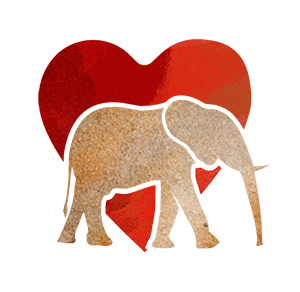After three days the decision was made to contact the David Sheldrick Wildlife Trust to come to his rescue. Aerial support from the DSWT Airwing was called in to help find the calf that morning, and thankfully early in the morning of the 23rd March we found the calf. It did not take long to spot him from the air, as he was the only elephant for miles, and the ground teams were guided in by radio. Being young the capture was straight forward as being weak he put up little resistance. He was driven by the Rombo Station Kenya Wildlife Service rangers to the closest airstrip in Ziwani, which is quite a lengthy drive in the back of a land cruiser.
In the meantime Angela Sheldrick had been informed of the rescue and plans had been put in place for a DSWT rescue team to depart from Nairobi in a Cessna Caravan, traveling the one hour flight to the Ziwani airstrip. On arrival they found the calf still recumbent in the back of a land cruiser, looking incredibly thin and dehydrated. The team took the precaution of immediately covering his eyes from the unforgiving sun, and placed him on a drip to help with his dehydrated condition before carefully loading him into the aircraft. As this was happening the team was again called by Angela this time with news that they would not be returning immediately to Nairobi with their casualty, but instead they would be flying onto the Voi airstrip located within Tsavo East National Park, this time to collect another young orphan just rescued after being first sighted by a tour driver. It was midday by the time the plane landed in Voi, and the newborn calf was already at the airstrip with DSWT Voi Keepers taking care of him. No time was wasted and he was immediately loaded into the back of the aircraft; now we had two orphaned elephants arranged in the back of the aircraft, each with a drip in place to help hydrate them throughout the journey. The team certainly had their hands full with two elephants on board for the flight back to base, and once there the unloading of their precious cargo required helping hands from various staff members within Wilson Airport, but thankfully everyone close to the plane was eager to help.
Once back at the Nairobi Nursery the older calf was placed in a stockade, and his infant companion placed in a stable, both with attentive Keepers by their side. It was anticipated the older calf was approximately 15 months old and the reason for him being orphaned remains a mystery to this day as no carcass was ever reported. He fed well on milk, but was not initially interested in the freshly cut greens placed in his stockade. He soon settled into his new routine and began to relish the available food, and grew stronger with each passing day.
With a little female called Mteto as his stockade neighbour he was able to draw great comfort from her presence and that of the other elephants when they surrounded him at night, communicating and comforting him with sounds not always audible to the human ear. We could visibly see him responding to their presence, settling down well and tolerating his Keeper, coming to take his milk bottle enthusiastically. During the day when the other orphans would leave for their days deep in the Nairobi National Park he became distressed, calling for them. With all the attention and comfort he received it was not long before we felt he had the strength and had grown tame enough to join the Nursery herd out in the bush during the day, and no longer needed to remain within the confines of his stockade; he was immediately embraced by the others, showered in elephant love and affection.
We have named this brave boy Mundusi, after the area from which he came, and he is a wonderfully calm little bull, who thankfully has settled in beautifully, and is now stout and very healthy with little plump cheeks.










































